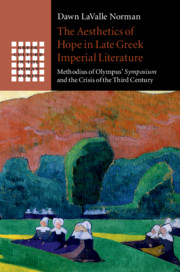 The Aesthetics of Hope in Late Greek Imperial Literature
The Aesthetics of Hope in Late Greek Imperial Literature Book contents
- The Aesthetics of Hope in Late Greek Imperial Literature
- Greek Culture in the Roman World
- The Aesthetics of Hope in Late Greek Imperial Literature
- Copyright page
- Contents
- Acknowledgments
- Introduction
- Chapter 1 Mapping Third-Century Literature from the Severans to Constantine
- Chapter 2 The End of Dialogue?
- Chapter 3 Compilation and Unity in Imperial Sympotic Traditions
- Chapter 4 Rhetoric and the Problem of Rivalry
- Chapter 5 The Lyric Tradition and Changing Hymnic Forms
- Conclusion
- Bibliography
- Index
Chapter 2 - The End of Dialogue?
The Christianization of a Tradition
Published online by Cambridge University Press: 15 November 2019
- The Aesthetics of Hope in Late Greek Imperial Literature
- Greek Culture in the Roman World
- The Aesthetics of Hope in Late Greek Imperial Literature
- Copyright page
- Contents
- Acknowledgments
- Introduction
- Chapter 1 Mapping Third-Century Literature from the Severans to Constantine
- Chapter 2 The End of Dialogue?
- Chapter 3 Compilation and Unity in Imperial Sympotic Traditions
- Chapter 4 Rhetoric and the Problem of Rivalry
- Chapter 5 The Lyric Tradition and Changing Hymnic Forms
- Conclusion
- Bibliography
- Index
Summary
In 362 CE, Julian the Apostate issued his famous School Edict, which effectively forbade Christians from teaching pagan texts. Decried by pagan and Christian alike, it also led to a rush of creative writing from a Christian father and son of the same name who were already well known as rhetoricians, the Apollinarii. The church historians Socrates and Sozomen relate that they took to transforming the Christian scriptures into new genres, to provide substitutes for the traditional pagan texts that were now forbidden for Christian teachers to use. The historical books of the Old Testament were translated into a mixture of heroic verse and tragedy, the Psalms into dactylic hexameter. But the Gospels were transformed into Platonic dialogues. In many ways, the intuition of the Apollinarii was a natural one: Jesus, like Socrates, was a wise man who spread his teaching through personal conversation and interaction, sometimes in the context of celebratory meals, until suffering death at the hands of the state for his subversive teaching. However, the choice seems far from natural to other readers and thinkers, especially certain modern scholars. For them, the playful seriousness and genuine openness of the Socratic-inspired dialogues of Plato (and presumably the other Socratics) is antipathetical to the spirit of Christianity.
- Type
- Chapter
- Information
- The Aesthetics of Hope in Late Greek Imperial LiteratureMethodius of Olympus' Symposium and the Crisis of the Third Century, pp. 69 - 118Publisher: Cambridge University PressPrint publication year: 2019
